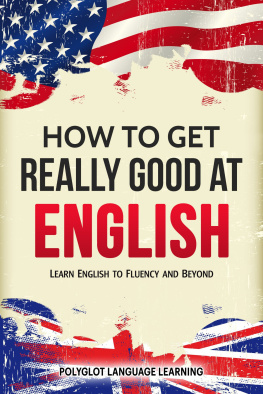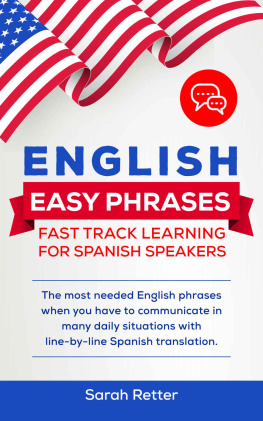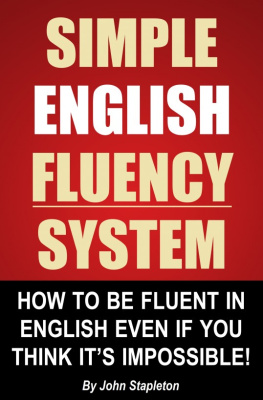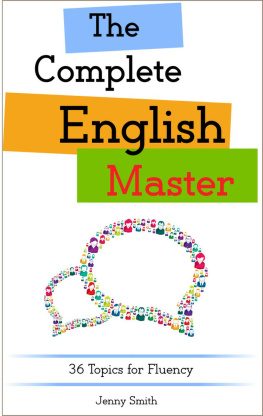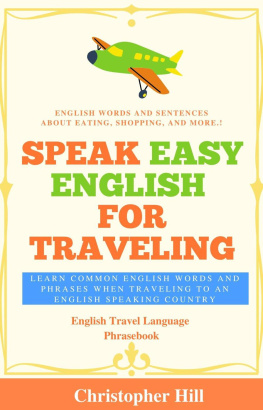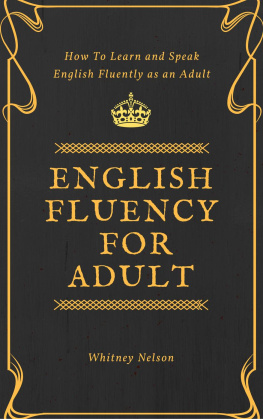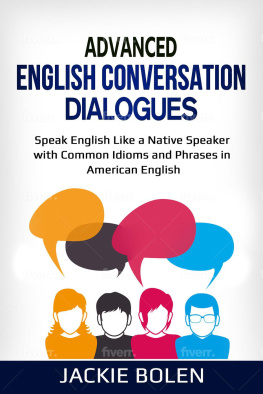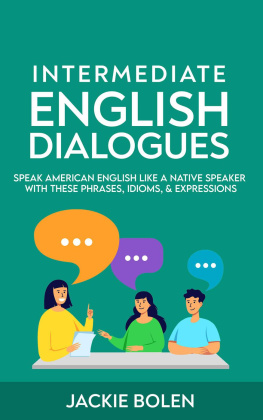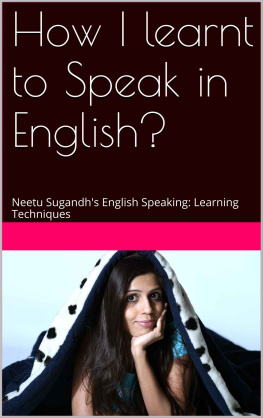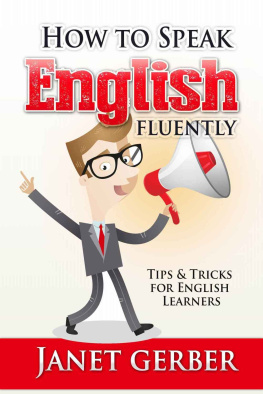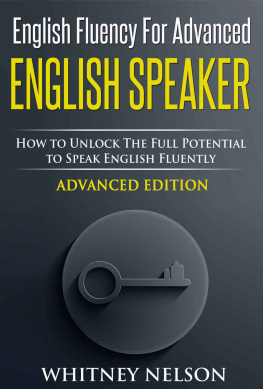HOW TO GET REALLY GOOD AT ENGLISH
Learn English to Fluency and Beyond
Polyglot Language Learning
FIRST EDITION
Copyright 2022. All rights reserved. This book or parts thereof may not be reproduced in any form, stored in any retrieval system, or transmitted in any form by any meanselectronic, mechanical, photocopy, recording, or otherwisewithout prior written permission of the publisher, except as provided by United States of America copyright law.
TABLE OF CONTENTS
When it comes to learning foreign languages, people want to learn fast. They want to save time. People want quick results, and they want to be able to speak fluently in a short amount of time.
But how long does it take to become fluent in English? The answer depends on your definition of the word fluent as well as your personal goals. Are you looking to visit the United States or the United Kingdom and learn a handful of words and phrases before departing? Do you want to be able to hold a basic conversation with strangers in English? Is your plan to work a job that requires English proficiency at the professional level?
When you understand how to learn a language fast and effectively, you will be able to meet all of those goals and go even further than you had previously imagined. Faster language learning methods and techniques do exist, and they can help you get to your goals exponentially faster.
To find these techniques and strategies, polyglots or people who speak several languages can offer us some important insight. Interviews, news stories, and viral videos with millions of views make these people out to be language geniuses, but if we look more closely at their stories rather than their abilities, the real truth begins to surface. They often struggle intensely in learning their first foreign language, but something finally clicks within the gears of their minds. They learn that first one and go on to easily learn three, four, or even more.
Also, they mostly all ditched school as a primary means to learn a language. Foreign language classes teach you about specific languages, but they do not teach you how to actually get good at a foreign language. After lectures and lengthy explanations, you are left to your own study devices to review massive amounts of vocabulary and grammar so that they hopefully stick in your head.
We don't know any better as first time language learners, so we memorize vocabulary and phrase lists, do workbooks, reread old dialogues, and repeatedly listen to the same audio tracks found in our coursebook CDs. It can be extremely boring at times, but if you are studious enough, you will finish and graduate.
Even upon graduation, however, you will find that school alone does not train our minds to understand the wide variety of vocabulary, sentence structures, and seemingly blazing fast speed that native speakers use in real life. While classes do offer several benefits for a hefty fee, they aren't enough. To truly reach an advanced level in a foreign language, you will need to become an autodidactic (self-taught) learner.
The Language Learning Bubble
Most polyglots weren't always good at learning foreign languages. It's a skill that they develop with each new language they take on. This is why the first one can be such a challenge for everybody.
Without that language learning skill and experience, trying to learn and memorize thousands of English words, phrases, and grammar structures can seem like the ultimate test. And then, native speakers spit all of this out at seemingly a bazillion words a minute. It certainly sounds like a lot of hard work and study will be needed.
It's hard to argue against the value of hard work. It creates high-quality results. It pushes people to do what they need to do. It gets things done. But in the case of learning a foreign language, hard work can be somewhat misleading.
Rereading, rewriting, and re-listening to the same vocabulary, sentences, dialogues, and short stories may work well enough to pass your school exams, but they are not very effective means to store new language in your long-term memory. They are also tedious and not very fun ways to learn.
These simple methods may put new words into your short-term memory, but if you hope to be a fluent English speaker one day, you'll need to store these words into your long-term memory and be able to recall them with ease. You'll need to instantly recognize them whether they are written or spoken.
All of this is possible and relatively easy to achieve, but traditional learning and study is not how you get to this point. While some initial study is recommended to learn and acquire the basics of English grammar including simple vocabulary and phrases, traditional learning and studying becomes less and less effective as the number of words and phrases you encounter increases.
Polyglots teach us that it is far more effective to learn and retain these thousands of words and phrases through extensively reading and listening to native materials. You get really good at English or any language not by reviewing and mastering a few hundred pages of grammar rules and vocabulary lists but by reading thousands of pages and listening to thousands of hours of native English.
Many language learners, however, do not freely read and listen to native materials, and it's easy to understand why. It's completely overwhelming in the beginner and intermediate levels. On a single page of anything written in native English, you'll find more words that you don't know than words that you do know. And it's extremely difficult to listen to native English for very long when you really can't understand anything that is going on.
Nothing is broken down nor explained in native materials, so it's very easy to understand why language learners gravitate towards mostly language learning materials. In traditional learning materials like coursebooks or classes for example, it's the exact opposite experience. Everything is broken down and explained so that is simple to digest and absorb.
While these instructional materials can be helpful especially in the beginner levels, the problem is that most language learners stay far too long within the bubble of these traditional learning methods and materials. They spend too much time memorizing and reviewing the few hundred or thousand words they have accumulated while native speakers use more than 30,000 words to communicate with each other in daily life.
The Crash and Burnout
A handful of hardcore English learners out there may determine that they just need to study for three or more hours a day to achieve the results they desire. We understand this deep and burning desire to learn, and we have even previously identified ourselves with that level of studious effort. It might seem like we should spend three or more hours studying every day considering all of the phrasebooks, coursebooks, grammar books, flashcard programs, apps, and online tools available.
If you have ever reached the intermediate stages of a foreign language, however, you might have experienced the frustration in trying to manage all of this studying and reviewing. You forget words. You forget grammar rules that you have read multiple times. And of course, native speakers still talk too fast. It's quite easy to find yourself in language learning hell. Many dedicated English learners simply burnout and quit before ever reaching fluency.
The truth, however, is that there is no need to study for three or more hours each day to achieve fluency. The real issue preventing many people from learning English is their definition of what it means to learn a foreign language. This problematic definition is formed from being required to take unimaginative and uninspired foreign language classes in high school and college. The excessive focus on studying and reviewing to pass exams in the short-term completely overshadows the long-term benefits of extensive reading and listening.
Next page
